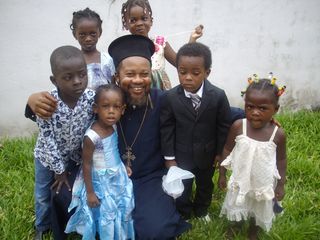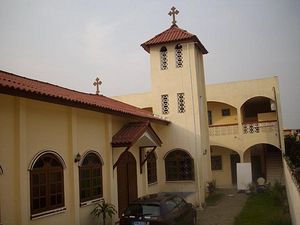Photo from here
Orthodoxy in Ghana
Wikipedia
Noncanonical orthodoxy emerged in Ghana in 1932.
The «African Universal Orthodox-Catholic Church» was organized by the charismatic African Bresi-Ando, but he and his followers vaguely knew the meaning of the term «Orthodoxy», and tried to find the true church. In 1972, Godfried Mantey and Kwame Joseph Labi, two of the church's youth leaders, read «The Orthodox Church» by Timothy (KALLISTOS) Ware which strengthened their church's religious quest. Two years later, Mantey and Labi met personally with representatives of the Orthodox world, and on 15 January 1978, Metropolitan Irineos, Metropolitan of Accra and All West Africa, (within the Patriarchate of Alexandria), made his first visit to the faithful of Ghana. By September 1982, the organization was admitted into the Orthodox communion within the Patriarchal Throne of Alexandria and All Africa. Now there is active missionary work, led by a resident archbishop. Thousands of Orthodox Christians from among the local population are served by 23 priests. A local Orthodox seminary is now open in Ghana.
The article was translated from Russian article Православие в Гане, where sources for the data are stated.
Corrections came from "A Brief History of the Orthodox Church in Ghana", the U.S. Fulbright research project of Andrew J. Anderson, available at the "Orthodox Research Institute" website.

Photo from here
Bishop Narkissos of Accra. From the article Akooaba! It means “Welcome”.
The Holy Archdiocese of Accra
Orthodoxwiki
The Holy Archdiocese of Accra is a diocese under the jurisdiction of the Greek Orthodox Patriarchate of Alexandria and All Africa. Its territory included the parishes and missions located in the nations of Ghana, Ivory Coast, Liberia, Sierra Leone, Senegal, Mali, Burkina Faso, Guinea, Guinea Bissau, and Gambia.
[Now: Ghana, Ivory Coast, Mali, Burkina Faso. About Sierra Leone, Liberia, Guinea, Guinea Bissau, Gambia, Senegal, and Cape Verde see Archdiocese of Conakry and Guinea.]
The missionary origins of the archdiocese date from the establishment of the Holy Metropolis of Accra and West Africa on January 23, 1959.[[1]] The archdiocese was initially established as the Diocese of Ghana by a Patriarchal and Synodal decree in 1997. On November 30, 1999, Bishop Panteleimon was elected the first bishop of Ghana and took up residence in the diocese on January 18, 2000. In 2004, Bishop Damaskinos succeeded him as the diocesan bishop.
On June 26, 2008, Father Theodoros II, Pope and Patriarch of Alexandria and All Africa, opened the Seminary of the Holy Metropolis of Ghana to serve the theological education needs of the metropolis.
The Diocese of Ghana was elevated to an archdiocese with the title of Archdiocese of Accra by a Patriarchal decree on October 6, 2009.
|
Photo from here From the article Just before the collapse Accra at Holy Transfiguration Orthodox Cathedral Church on Sunday 19th July, 2015 (from here) |
The archdiocese is divided into five hierarchal districts: The region of the broader area of Accra.
- The region of central Ghana.
- The region of eastern Ghana.
- The region of Ashanti and Volta.
- The region of the Ivory Coast.
Ruling Bishops
- Efstathios Efstathopoulos 1959 - 1975
- Irenaeus (Talambekos) 1976 - 1990
- Petros Papapetrou 1990 - 1997
- Panteleimon (Lampadarios) 1997 - 2004.
- Damaskinos (Papandreou) 2004 - 2010.
- George (Vladimirou) 2010 - 2012 (now he is Metropolitan of the Archdiocese of Conakry and Guinea)
- Savvas (Heimonettos) of Accra (2012 - present)
- In November 2015, Narkissos Metropolitan of Noubia [see here] was elected as Metropolitan of Accra, and was elected as Metropolitan Noubia the former Metropolitan Savvas of Accra (more here).
Photo from here (see also here)
See also
 Orthodox Church In Ghana - Facebook
Orthodox Church In Ghana - FacebookAkooaba! It means “Welcome”
Work is in progress to Akim Mreman for the construction of the tenth school-orphanage
Ortodox Mkristo Liturujia takatifu katika Kasoa, Ghana - Orthodox Christian holy liturgy in Kasoa, Ghana
Vérité Cherchant: Le cours passionnant de l'Eglise orthodoxe au Ghana
African Initiated Church in Search of Orthodoxy...
The Orthodox Church in Ivory Coast
Photo from here
Africa … Faith possible, many wonders . "We arrived," recounts Bishop Panteleimon of Ghana, "after 18 hours journey in the Ivory Coast and said : Now what?
And, when disappointed and we decided to return to Ghana, the phone rings. It was a group of people who for six years was looking the roots of Christianity upon research discoveries to Orthodoxy… their intentions are pure… I decided to baptize them…
We went to see the lagoon, where the next day would be a baptism. Full trash (up to 2,5 m from the coast). That will take the oil ? Where are It will be the mystery ? Would like months to clean it up… In the evening windstorm broke… the next morning there was not a debris… after… Blessed with captured heartbreaking pain. I had to go to hospital… I kept… were the first Orthodox Christians" (Africa of my heart).
«The Orthodox community in Ivory Coast has six new catechumens baptized this Sunday, October 18, 2015…» (from here)
Father Jeremie Behanzin reports from Africa’s Ivory Coast:
«Glory to God in the highest heaven. The Orthodox community in Ivory Coast has six new catechumens baptized this Sunday, October 18, 2015 in the presence of seventy two faithful, followed by the Divine Liturgy. The name of the Lord be praised. The Ivorian soil that accepts Orthodox Faith»
Pere Jeremie Behanzin’s photo.’
Photo from here
The Feast of the Exaltation of the Cross, celebrated in the Orthodox Church of the Ivory Coast the Sunday, 14 September 2014. The parish Holy Resurrection of Christ in Abidjan in the presence of the entire Orthodox community (here):

Photo from here
Photo from here
Eglise Orthodoxe de Côte d'ivoire - Facebook
Cries of the Orthodox Church of Ivory Coast
News & articles from the Orthodox Church in Ivory Coast
"Heart Doctors" in Ivory Coast (in Greek)
In Search of Orthodoxy
See also:
Orthodox priest in Ivory Coast tells of extreme danger to community during current civil war - March 17, 2011 (Pravoslavie.ru)

Priest Jeremiah Behanzin, rector of the Orthodox parish in the Ivory Coast capital of Abidjan, told of the catastrophic situation in his community in a country where order has completely deteriorated, reports the French Orthodox website, Orthodoxie.
"It is with great sorrow that I report the situation in our Orthodox community in Ivory Coast. The country is becoming unbearable due to the absence of safety. The army and insurrectionists shoot at innocent people. Every day we lose people. At the present, we have more than 5,000 people, including our faithful, who have become refugees because of the war. People have abandoned their homes, taking only their children and the minimal baggage they can carry on their heads, because they are met with gunfire everywhere. Because of the military activity, it is impossible to find a place to sleep, even on the street or at the stations," relates Fr. Jeremiah.
"In our region, Abobo Baoule, where the Orthodox Church is located, militia, police, and insurrectionists are shooting all the time, and we can no longer sleep peacefully. We are afraid that the situation in the country will get even worse. The banks are closed. We have nothing more to eat," the Orthodox priest said.
Orthodox Church in the capital of Ivory Coast attacked by militants - February 29, 2012 (Pravoslavie.ru)

|
The militants broke into the churchyard by climbing over the fence. From there the criminals entered the house where the church rector, Priest Jeremiah Behanzin, resides with his wife and child.
The intruders broke down the door of the priest’s apartment using the butts of their machine guns and woke the family, then began looting the house.
The looting spree lasted two hours. The robbers took away whatever they could find of value, including two notebook computers. Also stolen were the radio, battery, and other objects from the priest’s automobile.
Ivory Coast, Easter 2016 (see here)
See also
Eight principal areas of convergence between African spirituality and Ancient Christianity
Orthodox Mission in Tropical Africa (& the Decolonization of Africa)











Father,
ΑπάντησηΔιαγραφήIs there a physical church in Cape Verde?